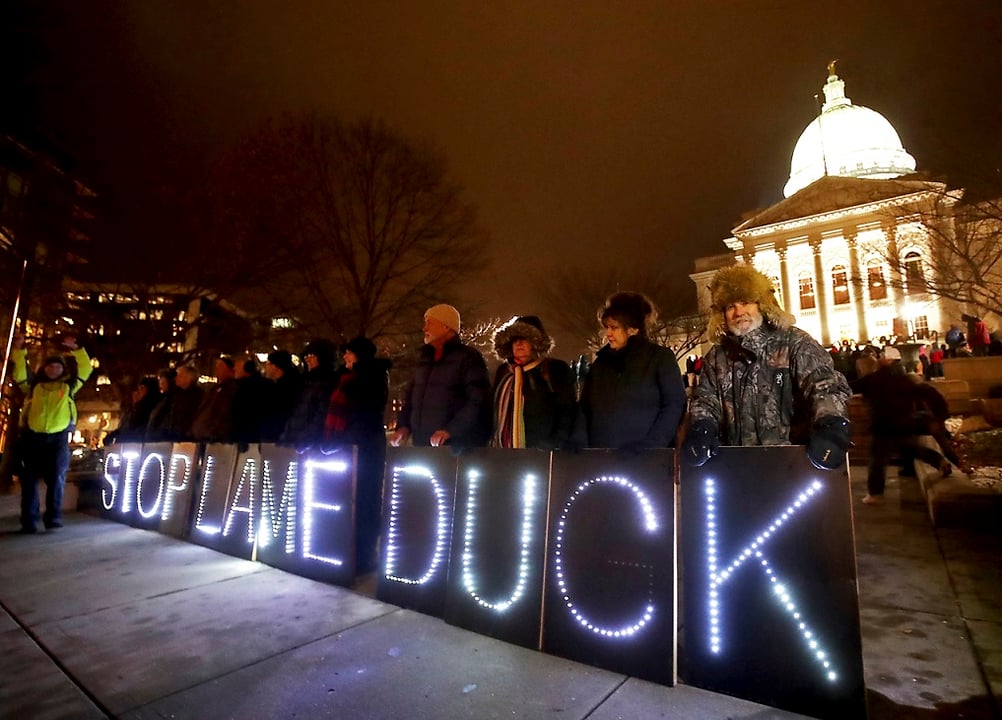MADISON, Wis. (CN) — The Wisconsin Supreme Court on Thursday upheld the lion’s share of lame duck laws passed by the GOP-controlled Legislature in late 2018 to limit the powers of the new Democratic governor and attorney general.
The lengthy ruling delivers what can mostly be seen as a win for Badger State conservatives, who have been vindicated by Wisconsin courts at almost every turn in the sprawling two-year intragovernmental fight over bills passed in a hurried extraordinary session of the legislature.
They were signed into law by former Republican Governor Scott Walker in December 2018, weeks after current Governor Tony Evers and Attorney General Josh Kaul won elections against conservative incumbents but before they were sworn into office.
Two weeks after the election, in which liberals won every statewide office, the Wisconsin Legislature called a surprise extraordinary session to pass what would become Wisconsin Acts 369 and 370. The wide-ranging laws rein in the executive powers of the governor and the attorney general and give lawmakers more oversight powers over the executive branch, as well as afford the body greater leverage to intervene in a variety of executive functions.
In part, the laws give the legislature the power to block rules the governor executes with regard to health care waivers and welfare programs such as food stamps, among other measures. In addition, they grant legislators standing to intervene in the state’s lawsuits and require the attorney general to clear any of the state’s court settlements with a Republican-controlled committee that oversees the legislative purse.
The underlying case germane to Thursday’s decision, one of roughly half a dozen legal actions thrown down over the lame-duck provisions, was first filed in February 2019 by local unions, including a chapter of the Service Employees International Union, or SEIU.
The suit challenged the constitutionality of the legislature’s right to get involved in functions typically designated to the executive branch via separation of powers.
Dane County Circuit Court Judge Frank Remington agreed with the unions and blocked most of the lame duck laws in March 2019, but the Wisconsin Supreme Court reinstated most of them three months later while the case played out.
The SEIU’s case was bitterly argued before Wisconsin’s high court for more than two hours in October 2019, and for the most part the conservative-majority court came down on the side of the legislature Thursday, finding that the laws have at least some constitutional applications.
In the first of the two majority opinions published Thursday, conservative Justice Brian Hagedorn importantly noted at the outset the labor organizations and taxpayers’ complaint “unequivocally presents a facial attack on all the laws challenged,” meaning they wanted the laws to be declared unconstitutional in any application and struck down in their entirety.
This set a high bar for the unions bringing the suit, as they would have had to prove there is not a single constitutional application for the laws—a standard Hagedorn and the high court found they did not meet.
Hagedorn wrote specifically that the laws allowing the legislature to get involved in state litigation were legitimate. That decision and most others Thursday split 5-2 along party lines.
“The legislature may have an institutional interest in litigation implicating the public purse or in cases arising from its statutorily granted right to request the attorney general’s participation in litigation,” he said, dispensing with the plaintiffs’ argument that the provision basically takes an essential executive function and hands it to the legislature.
“The takeaway is that the constitution gives the legislature the general power to spend the state’s money by enacting laws,” Hagedorn added. “Therefore, where litigation involves requests for the state to pay money to another party, the legislature, in at least some cases, has an institutional interest in the expenditure of state funds,” justifying intervention.










